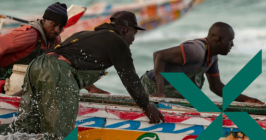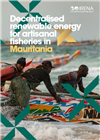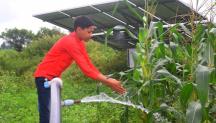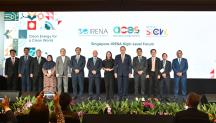

-
-
IRENA (2025), Decentralised renewable energy for artisanal fisheries in Mauritania, International Renewable Energy Agency,\ Abu Dhabi.
Copied
https://www.irena.org/-/media/Files/IRENA/Agency/Publication/2025/Sep/IRENA_PAR_RE_artisan_fisheries_Mauritania_2025.pdf
Copied
Decentralised renewable energy for artisanal fisheries in Mauritania
Newsletter
Mauritania’s fisheries sector is a critical pillar of the national economy, representing 2.8% of GDP in 2023, supporting 66 000 direct jobs and 300 000 indirect jobs, and accounting for 14.9% of the primary sector’s output and 19.9% of total export earnings. Mauritania ranks as the second largest producer and exporter of fish products in Africa, contributing 8.3% of total African production and 10.7% of total exports. Total fish catch in 2023 was 845 000 tonnes, with the artisanal sub-sector accounting for about 40% of total annual catch.
The artisanal fishing sub-sector is particularly important, generating approximately 80% of the sector's added value and employment. However, access to reliable and affordable energy is one of the key constraints limiting the growth of this value chain, with the sector relying heavily on fossil fuels to power operations – from catch to conservation, processing, and distribution – undermining profitability, inflating operational costs, and exacerbating greenhouse gas (GHG) emissions. This report assesses the opportunities and barriers for deploying decentralised renewable energy (DRE) solutions to power Mauritania's artisanal fishing value chain. It maps out the most suitable DRE solutions for different segments of the value chain to support decarbonisation efforts and improve energy access in the sector, using key financial metrics (net present value and internal rate of return) to assess the viability of the proposed solutions.
The report also identifies policy and regulatory bottlenecks, limited access to financing, limited supply chains and low technical expertise as key barriers to DRE integration in fisheries, amongst others. Based on these findings, the report recommends priority actions (on policy, finance, supply chain development, institutional capacity building, awareness raising etc.) to overcome these barriers and enhance the DRE ecosystem in Mauritania to stimulate its adoption in the artisanal fisheries sector, thereby reducing dependence of fossil fuels, increasing productivity and profitability, and empowering livelihoods. The successful implementation of these solutions requires a concerted effort from the government, with support from technical and financial partners to raise awareness among actors, build technical and institutional capacities, facilitate access to affordable financing, and support the development of the local DRE ecosystem.




